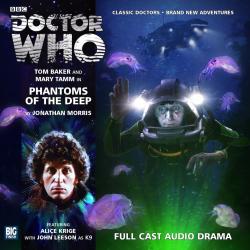Phantoms of the Deep (Big Finish)
Monday, 17 June 2013 - Reviewed by Matt Hills

Phantoms of the Deep
Big Finish Productions
Written by Jonathan Morris
Directed by Ken Bentley
Released May 2013
Despite basic similarities, however, there are also a host of differences. Cold War needed to expend energy on reintroducing a classic monster, whereas Phantoms is unencumbered by any such need. And where Mark Gatiss’s screenplay necessarily had to pay close attention to budgetary constraints, Morris is free to throw in super squid as well as vampire squid and giant jellyfish: there are sea creatures galore featured here, with Big Finish playing extremely well to its audio strengths. Sound design also helps to convey the tension and isolation of characters trapped in various submarine vehicles, using a host of pinging, echoing underwater and radio communication effects to generate an acute sense of imagined place.
Sometimes across this series of fourth Doctor tales Tom Baker has been given a running gag (it was a desire for hard-boiled eggs in The Sands of Life, for instance), but there’s less obvious tomfoolery on this occasion, and Baker’s performance is all the better for it. He also finally gets to play off John Leeson more substantially, as a repaired K9 is given a far meatier role than he’s had of late. In fact, the cliffhanger to part one represents a stroke of genius from Jonathan Morris, turning one characteristic K9 expression into a chilling expression of threat. It’s a great moment, reminding the listener just how much televised Doctor Who has missed its traditional cliffhangers in recent times.
K9 also gets to communicate with some highly unexpected allies, and at least one event that would probably sound absurd if I summarized it here actually works well in content. Morris’s dialogue also takes the opportunity to poke gentle fun at the K9 prop; offered assistance by Romana, K9 notes that he’s “perfectly capable of traversing flat metal floors”. Along with using the robot dog effectively, Phantoms of the Deep also gives the TARDIS a memorable entrance, and as the cover image makes clear, the Doctor gets to supplement his characteristic costume with underwater/diving garb, venturing the observation that he’s a very strong swimmer. Clearly enjoying putting his lead characters in some unusual settings, Morris’s versatility comes across powerfully when you compare this release with The Auntie Matter; whether crafting Wodehouse pastiche or base-under-siege ghostliness, the writer seems equally at home.
Phantoms does hit a number of eminently predictable story beats, mind you – given that we have a deep-sea sub exploring the Mariana Trench, there’s precious little doubt that something nasty is going to be lurking down in the blackness of the ocean floor. And the title alone promises some kind of spectral presence. But this story still finds ways to surprise its audience – themes of possession may not be earth-shatteringly original, but there are a few new wrinkles to how events play out this time around. There’s a particular emphasis on the mind as well as the body, for instance.
The cast are all decent enough, though I’m not convinced they are greatly challenged by script requirements. Indeed, director Ken Bentley discusses how they rattled through scenes at quite a pace when making the story, and it’s easy to see how the limited settings and small cast would lend themselves to quickfire production. Alice Krige plays Dr. Patricia Sawyer; sadly her character feels a little identikit rather than really coming to life, and likewise other crew-members of the Deep Submergence Vehicle Erebus feel fairly generic – not that the story’s tight focus gives many opportunities for individuation. Phantoms of the Deep is very much action-oriented, so this is a rather inevitable outcome.
Gwilym Lee as young midshipman Jack Hodges is given a more unusual role amid the twenty-first century scientist-explorers, as Phantoms presents us with what, on the face of it, can only be an impossible lad. The collision of different character types doesn’t give rise to perhaps as much dramatic tension as it could, however, and there’s a “fish out of water” story bubbling away under the surface rather than really being given room to breathe. If this were a contemporary TV episode we’d no doubt be offered a greater emotional connection to Hodges and his strange plight, whereas here the emphasis is very much on a mystery to be resolved. Horses for fourth Doctor courses, though: Phantoms still feels like it belongs to its era, despite Morris’s characteristic playfulness. This is a satisfying addition to what has thus far been an occasionally uneven run of Tom Baker and Mary Tamm stories. The inventiveness of Phantoms isn’t submerged by ongoing story strands: it offers a self-enclosed, stand-alone and tension-filled tale before we're due to return to the character of Cuthbert for The Dalek Contract.







